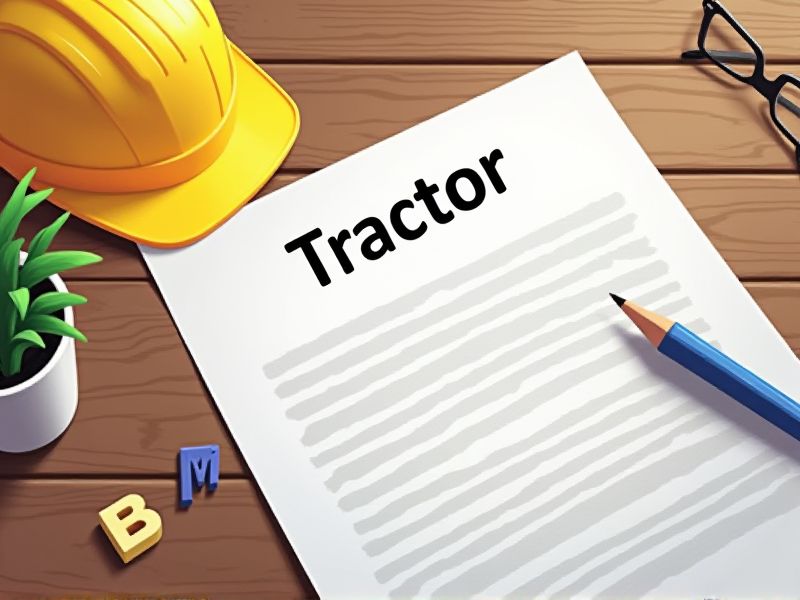
Tractor operators handle heavy machinery that requires precision and adherence to safety standards. Certification ensures operators understand equipment functionality and can mitigate risks effectively. Without proper credentials, operators might inadvertently cause accidents, leading to equipment damage or personal injury. These are essential certifications for a tractor operator.
Tractor Operator Certification
Tractor Operator Certification ensures that operators have the necessary skills and knowledge to safely handle machinery, reducing the risk of accidents. Certified operators can effectively maintain and operate tractors, leading to increased productivity and fewer operational delays. The certification validates the operator's competence, which can be crucial for employers when hiring or promoting personnel. It also ensures compliance with local and national safety regulations, avoiding potential legal issues and fines.
Heavy Equipment Operator Certification
The Heavy Equipment Operator Certification ensures that a tractor operator has the necessary skills and knowledge to safely and efficiently handle machinery, reducing the risk of accidents. Employers often require certification as it serves as proof of competency and adherence to industry standards. Certification programs typically cover maintenance protocols, which enhances the longevity and performance of the tractors. Certified operators are also likely to be more productive, as they possess specialized training to handle complex tasks with precision.
OSHA Safety Training Certification
OSHA Safety Training Certification ensures tractor operators understand and comply with safety regulations, reducing the risk of workplace accidents. This certification educates operators about proper equipment handling, which directly affects operational efficiency and workplace safety. With training, operators can identify potential hazards, preventing incidents that could lead to serious injuries or fatalities. Employers can mitigate legal liabilities and potential financial losses by certifying their operators in safety protocols.
Agricultural Safety Certification
Agricultural safety certification ensures tractor operators possess the necessary knowledge to operate machinery safely, reducing the risk of accidents. Data indicates that certified operators are significantly less likely to be involved in hazardous incidents, promoting farm safety. Mandating certification leads to increased awareness about potential hazards, contributing to safer work environments. Improved safety standards and practices can enhance productivity by minimizing downtime caused by accidents or equipment damage.
First Aid and CPR Certification
Tractor operators work in environments where accidents, such as rollovers or machinery entanglements, can occur, necessitating immediate first aid intervention to mitigate injuries. Possessing CPR certification enables operators to respond effectively to sudden cardiac emergencies, which can arise due to stress or underlying health issues while on the job. Familiarity with first aid procedures reduces the company's liability by ensuring a quicker response time, potentially saving lives and minimizing the severity of injuries. Regulatory requirements in certain jurisdictions mandate such certifications for equipment operators, ensuring adherence to safety standards and reducing workplace incidents.
Defensive Driving Certification
Defensive Driving Certification equips tractor operators with skills to anticipate and mitigate potential hazards, reducing accident rates. With enhanced situational awareness, operators can handle unexpected obstacles in farming and construction environments safely. Certification often leads to fewer workplace incidents, lowering operational downtime and costs for employers. A certified operator demonstrates compliance with safety regulations, improving trust and accountability within the organization.
Farm Machinery Safety Certification
Farm machinery safety certification mitigates the risk of accidents by ensuring tractor operators are knowledgeable about safe operation practices. This certification standardizes the competencies required, reducing variability in safety awareness among operators. Tractor operators with safety certification are more adept at identifying potential hazards and responding appropriately, enhancing workplace safety. Insurance companies often recognize certified operators, potentially lowering policy premiums for farms that insist on such training.
Commercial Driver's License (CDL)
Commercial Driver's License (CDL) is required for tractor operators because it ensures they have the necessary skills and knowledge to safely operate large vehicles. Federal regulations mandate CDL requirements to reduce the risk of road accidents involving heavy machinery. Possessing a CDL indicates that the driver understands the specific operational and safety procedures essential for handling commercial-sized tractors. This licensing also helps employers maintain compliance with legal standards, avoiding potential fines and liabilities.
Basic Equipment Maintenance Certification
Basic Equipment Maintenance Certification ensures tractor operators maintain safety standards. Proper maintenance reduces equipment downtime, optimizing farm productivity. Certified operators often experience fewer accidents, minimizing injury risks. Regular maintenance knowledge extends the tractor's lifespan, reducing long-term repair costs.
Emergency Response Training Certification
Tractor operators often work in remote or isolated areas, where immediate medical assistance might not be accessible, necessitating emergency response training. Operating heavy machinery increases the risk of accidents, which could lead to serious injuries that require prompt attention. Knowledge of emergency response protocols can significantly reduce downtime during incidents, maintaining operational efficiency. Certification programs can provide operators with skills that enhance workplace safety, benefiting both employees and employers by potentially lowering insurance costs and liability risks.
Summary
When you gain certification as a tractor operator, your employment opportunities can increase significantly as employers tend to favor certified candidates. Certified operators are often better equipped to handle machinery safely, reducing workplace accidents and boosting productivity. Earning certification typically leads to higher earning potential, as skills are validated and more in-demand. Certified operators are better prepared for technical challenges, resulting in more efficient operation and maintenance of equipment.
